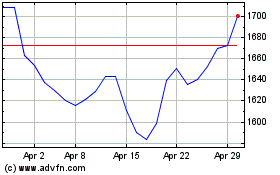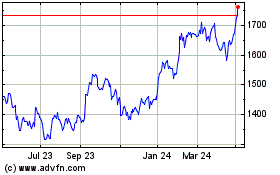TIDMGSK
RNS Number : 3578I
GSK PLC
02 December 2022
Issued: 2 December 2022, London UK
Jemperli (dostarlimab) RUBY phase III trial met its primary
endpoint in a planned interim analysis in patients with primary
advanced or recurrent endometrial cancer
-- Results showed a statistically significant and clinically
meaningful improvement in investigator-assessed progression-free
survival
-- RUBY is the only first-line trial to show improvement in
progression-free survival for an immuno-oncology therapy in
combination with standard-of-care chemotherapy in primary advanced
or recurrent endometrial cancer
-- Regulatory submissions based on the trial results are planned for the first half of 2023
GSK plc (LSE/NYSE: GSK) today announced positive headline
results from the planned interim analysis of Part 1 of the
RUBY/ENGOT-EN6/GOG3031/NSGO phase III trial investigating Jemperli
(dostarlimab) plus standard-of-care chemotherapy
(carboplatin-paclitaxel) followed by Jemperli compared to
chemotherapy plus placebo followed by placebo in adult patients
with primary advanced or recurrent endometrial cancer. The trial
met its primary endpoint of investigator-assessed progression-free
survival (PFS). It showed a statistically significant and
clinically meaningful benefit in the prespecified mismatch repair
deficient (dMMR)/microsatellite instability-high (MSI-H) patient
subgroup and in the overall population. A clinically relevant
benefit in PFS was also observed in the mismatch repair proficient
(MMRp)/microsatellite stable (MSS) patient subgroup.
While the overall survival (OS) data were immature at the time
of this analysis, a favourable trend was observed in the overall
population, including both the dMMR/MSI-H and MMRp/MSS
subgroups.
The safety and tolerability profile of dostarlimab in the RUBY
phase III trial was consistent with clinical trials of similar
regimens. The most common treatment-emergent adverse events in
patients receiving dostarlimab plus chemotherapy were nausea,
alopecia, fatigue, peripheral neuropathy, anaemia, arthralgia,
constipation and diarrhoea.
Hesham Abdullah, Senior Vice President, Global Head of Oncology
Development, GSK, said: "Patients with primary advanced or
recurrent endometrial cancer have limited treatment options.
Long-term outcomes remain poor, and new treatment options are
urgently needed to evolve the current standard of care, which is
platinum-based chemotherapy. Based on these positive headline
results from the RUBY phase III trial, GSK intends to seek
regulatory approvals for a potential new indication for dostarlimab
in the treatment of primary advanced or recurrent endometrial
cancer."
Regulatory submissions based on the trial results are
anticipated in the first half of 2023. Full results from the trial
will be published in a medical journal and presented at an upcoming
scientific meeting.
RUBY is part of an international collaboration between the
European Network of Gynaecological Oncological Trial groups
(ENGOT), a research network of the European Society of
Gynaecological Oncology (ESGO) that consists of 22 trial groups
from 31 European countries that perform cooperative clinical
trials, and the GOG Foundation, a non-profit organisation dedicated
to transforming the standard of care in gynaecologic oncology.
About endometrial cancer
Endometrial cancer is found in the inner lining of the uterus,
known as the endometrium. It is the most common gynaecologic cancer
in the US and the second most common gynaecologic cancer globally.
([i]) Approximately 15-20% of women with endometrial cancer will be
diagnosed with advanced disease at the time of diagnosis.
([ii])
About RUBY
RUBY is a two-part global, randomised, double-blind, multicentre
phase III trial of patients with primary advanced or recurrent
endometrial cancer. Part 1 is evaluating dostarlimab plus
carboplatin-paclitaxel followed by dostarlimab versus
carboplatin-paclitaxel plus placebo followed by placebo. Part 2 is
evaluating dostarlimab plus carboplatin-paclitaxel followed by
dostarlimab plus niraparib versus placebo plus
carboplatin-paclitaxel followed by placebo. The primary endpoints
in Part 1 are investigator-assessed PFS based on the Response
Evaluation Criteria in Solid Tumours v1.1 and OS. In Part 2, the
primary endpoint is investigator-assessed PFS. Secondary endpoints
in Part 1 and Part 2 include PFS per blinded independent central
review, overall response rate, duration of response, disease
control rate, patient-reported outcomes, and safety and
tolerability.
About Jemperli (dostarlimab)
Jemperli is a programmed death receptor-1 (PD-1)-blocking
antibody that binds to the PD-1 receptor and blocks its interaction
with the PD-1 ligands PD-L1 and PD-L2. ([iii]) Dostarlimab is being
investigated in registrational enabling studies, as monotherapy and
as part of combination regimens, including in women with recurrent
or primary advanced endometrial cancer, women with Stage III or IV
non-mucinous epithelial ovarian cancer, and patients with other
advanced solid tumours or metastatic cancers.
In the US, dostarlimab is indicated for adult patients with dMMR
recurrent or advanced endometrial cancer, as determined by an
FDA-approved test, that have progressed on or following prior
treatment with a platinum-containing regimen. Dostarlimab is also
indicated in the US for patients with dMMR recurrent or advanced
solid tumours, as determined by an FDA-approved test, that have
progressed on or following prior treatment and who have no
satisfactory alternative treatment options. These indications are
approved in the US under accelerated approval based on tumour
response rate and durability of response. Continued approval for
these indications may be contingent upon verification and
description of clinical benefit in a confirmatory trial(s).
Dostarlimab was discovered by AnaptysBio and licensed to TESARO,
Inc., under a collaboration and exclusive license agreement signed
in March 2014. The collaboration has resulted in three monospecific
antibody therapies that have progressed into the clinic. These are:
dostarlimab (GSK4057190), a PD-1 antagonist; cobolimab,
(GSK4069889), a TIM-3 antagonist; and GSK4074386, a LAG-3
antagonist. GSK is responsible for the ongoing research,
development, commercialisation, and manufacturing of each of these
medicines under the agreement.
Important Information for Jemperli in the EU
Indication
Dostarlimab is indicated as monotherapy for the treatment of
adult patients with mismatch repair deficient (dMMR)/microsatellite
instability -- high (MSI -- H) recurrent or advanced endometrial
cancer that has progressed on or following prior treatment with a
platinum -- containing regimen.
Refer to the Jemperli EMA Reference Information for a full list
of adverse events and the complete important safety information in
the EU.
About GSK
GSK is a global biopharma company with a purpose to unite
science, technology, and talent to get ahead of disease together.
Find out more at gsk.com/company .
GSK enquiries
Media: Tim Foley +44 (0) 20 8047 (London)
5502
Madeleine Breckon +44 (0) 20 8047 (London)
5502
Kathleen Quinn +1 202 603 5003 (Washington DC)
Lyndsay Meyer +1 202 302 4595 (Washington DC)
Investor Relations: Nick Stone +44 (0) 7717 618834 (London)
James Dodwell +44 (0) 20 8047 (London)
2406
Mick Readey +44 (0) 7990 339653 (London)
Josh Williams +44 (0) 7385 415719 (London)
Jeff McLaughlin +1 215 751 7002 (Philadelphia)
Frannie DeFranco +1 215 751 4855 (Philadelphia)
Cautionary statement regarding forward-looking statements
GSK cautions investors that any forward-looking statements or
projections made by GSK, including those made in this announcement,
are subject to risks and uncertainties that may cause actual
results to differ materially from those projected. Such factors
include, but are not limited to, those described in the Company's
Annual Report on Form 20-F for 2021, GSK's Q3 Results for 2022 and
any impacts of the COVID-19 pandemic.
Registered in England & Wales:
No. 3888792
Registered Office:
980 Great West Road
Brentford, Middlesex
TW8 9GS
[i] Braun MM, et al. Am Fam Physician. 2016;93(6):468-474.
[ii] Kantar Health, Cust Study (2018).
[iii] Laken H, Kehry M, Mcneeley P, et al. Identification and
characterization of TSR-042, a novel anti-human PD-1 therapeutic
antibody. European Journal of Cancer. 2016;69,S102.
doi:10.1016/s0959-8049(16)32902-1.
This information is provided by RNS, the news service of the
London Stock Exchange. RNS is approved by the Financial Conduct
Authority to act as a Primary Information Provider in the United
Kingdom. Terms and conditions relating to the use and distribution
of this information may apply. For further information, please
contact rns@lseg.com or visit www.rns.com.
RNS may use your IP address to confirm compliance with the terms
and conditions, to analyse how you engage with the information
contained in this communication, and to share such analysis on an
anonymised basis with others as part of our commercial services.
For further information about how RNS and the London Stock Exchange
use the personal data you provide us, please see our Privacy
Policy.
END
RESBKDBDNBDBFBK
(END) Dow Jones Newswires
December 02, 2022 02:00 ET (07:00 GMT)
Gsk (LSE:GSK)
Historical Stock Chart
From Mar 2024 to Apr 2024

Gsk (LSE:GSK)
Historical Stock Chart
From Apr 2023 to Apr 2024
